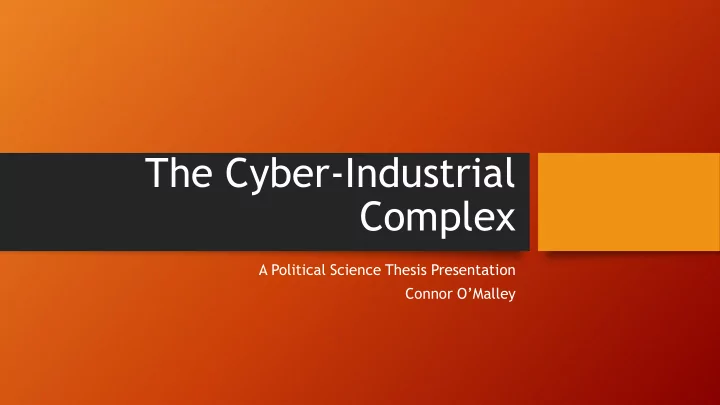

The Cyber-Industrial Complex A Political Science Thesis Presentation Connor O’Malley
The Snowden Files • June of 2013, The Guardian begins posting leaks from the National Security Agency (NSA) • Leaks contain documents outlining a mass surveillance system being operated by NSA • Telephony Metadata- not content, # dialed, time, frequency • PRISM- entire content of electronic communications • Direct Access to servers at Microsoft, Yahoo, Google, Facebook, Paltalk, AOL, Skype, Youtube. 282 million communications/year • Boundless Informant- raw intelligence organizer • Total 97 billion global communications in 30 days • FISA 1978, Patriot Act 215, EO 12333
Snowden • Source identified as Edward Snowden • Accumulated files while working at NSA • Not actual employee “intelligence contractor” for Booz Allen Hamilton • First job in IC in 2005 at CIA • 2009 transferred to NSA working for Dell • 2012 new job at BAH, still at NSA • Downloaded files throughout 2012
Iron Triangles • Cooperative political relationships • Congressional Committee, Administrative Agency, and a Special Interest • Few members, stable, predictable • Revolving doors • Little access • Can create policy independently
Issue Networks • Have many members, broad focus, easy access • When citizens began to participate more in 60s-70s, large issue networks begin to form • Success with Civil Rights, Environmentalism • Once the barrier to entry are gone, the Iron Triangle is destabilized and degrades into an Issue Network • Creates feedback loop, more people get involved, improves access, more people get involved
Cyber-Industrial Complex • Senate Select Committee on Intelligence • 15 members, 8 majority, 7 minority • Reps from Foreign Relations, Armed Services, Judiciary, Appropriations • National Security Agency, Central Intelligence Agency, Defense Intelligence Agency, Office of the Director of Intelligence, National Reconnaissance Office • AT&T , BAE, Booz Allen Hamilton, Boeing, General Dynamics, Lockheed, Northrop, Raytheon, Verizon • Senators need campaign funding/pork, agencies need intelligence, contractors need contracts
Revolving Doors • Mike McConnell, the Executive VP of BAH’s National Security branch, was the Dir. Of NSA under President H.W. Bush, and the Director of National Intelligence under President G.W. Bush. • James Clapper, Director of NSA, previous BAH executive. • Richard Kerr, FMR Dep. Dir. CIA, BAE executive • Gen. Kenneth Monihan FMR Dir. Of NSA, BAE executive • Michael Hayden, FMR Dir. Of NSA, Executive at Chertoff group, intelligence consultancy firm.
Privatization • Began after Cold War ended in attempt to downsize • Accelerated after 9/11 to accommodate demand • Presently, as much of 70% of the intelligence budget goes to private sector • 480,000 private contractors with “top secret” clearance or better • Over 2,000 companies contract with federal government • Everything from janitorial services, spying, blackwater • Operation Groundbreaker, BAH privatization initiative • Contractors involved in collection, analysis, production of reports
The Budget Visualized
My Research • RQ: Does the amount of money a Senator receives from contractors change the way they vote? • Hypothesis: The more money a senator receives from intelligence contractors, the more likely they are to be in favor of surveillance • Variables: Senate roll call votes, cloture motions, amendments, campaign donations, defense spending per state, defense employees per state
Surveillance Index • H.R. 2048 USA FREEDOM ACT to reform bulk collection • Cloture motion • McConnell Amendments meant to keep it the same • S. 1357 • Extend the authority relating to roving surveillance • McConnell again • S. 754 Cyber Information Sharing Act • Immunity for companies that give data to the government • Democrat Mean: .93 • Republican Mean: 5.49 • Total: 3.27
Contributions Index • Total each candidate received from AT&T , BAE, Booz Allen Hamilton, Boeing, General Dynamics, Lockheed, Northrop, Raytheon, Verizon • Only four Senators received 0 dollars • Most was Richard Shelby AL at $380,000 • Democrat mean: $103,337 • Republican mean: $115, 483 • Independent mean: $46,100 • Total: $108,630
Correlations Surveillance Index Contributions Index Party 0,1 Defense Spend Personnel Surveillance Index 1 R=.220* Sig=.034 R=.793** Sig=.000 R=-.041 Sig=.695 R=.074 Sig=.480 Contributions Index R=.2208 Sig= .034 1 R=.070 Sig=.492 R=.171 Sig=.089 R=.192 Sig=.056 Party 0,1 R=.7938 Sig=.000 R=.070 1 R=-.136 Sig=.183 R=-.010 Sig=.920 Sig=.492 Defense Spend R=-.041 Sig=.695 R=.171 R=-.136 Sig=.183 1 R=.783** Sig=.000 Sig=.089 Personnel R=.074 Sig=.074 R=.192 R=-.010 Sig=.920 R=.783** Sig=.000 1 Sig=.056
Regression • Surveillance Index=Y= (Party) + (Contributions Index) + (Defense Spend) + (Personnel) B Std. Error t p Constant .303 .381 .795 .429 Party_dum 4.516 .376 12.007 .000 Contribution .000004 .000 1.946 .055 Index Defense .000000000006 .000 .179 .858 Spending Personnel .000003 .000 .510 .612
Scatterplot • Clusters at the top and bottom show party polarization • R 2 = .405 • Variables explain almost half the variation in Surveillance index scores • Party is much more decisive but contributions do play a small part
Conclusions • Contributions play a role, party is much more indicative of privacy vs surveillance stance • IC has characteristics of both Iron Triangles and Issue Networks • While in secret it is an Iron Triangle • Very little access, independent policy making • After the leaks, the involvement of public and press destabilize the Triangle and forms an Issue Network
Recommend
More recommend